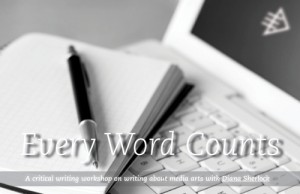Notes from the Every Word Counts workshop with Diana Sherlock.
Pitching, basics of pitching.
Discussion of ethical writing practice:
- conflicts of interest
- routed in notion of being objective
- need to be aware of decision you make to make sure you keep to your story of your opinion but never let artist read it (this includes catalogues)
- keep some objective distance
- can’t be paid by the artist you are writing about (otherwise it is promotional writing) publisher + writer /= artist
Questions addressed:
1. What kind of writer are you? Poetic, ficto-criticism, daily journalism, art journalism, blogs.
2. What is critical writing? Critical framework through which you interpret. Open up the work to other contexts.
Deconstructing the writing process
Invention/pre-writing
- brainstorming
- mind mapping
- free writing
- the pentad (who, what etc)
- when you have the impetus get the ideas down have faith that your idea matters, focus on idea of resonance.
Drafting/Disposition
- outline
- thesis
- body of text
- conclusion
- get your ideas down, source from the artist and from secondary sources
- is your thesis a question or a statement?
- think about form of text, audience etc
- thesis will give us a direction for a persuasive argument
- item that is missing from critical writing, the way a good sentence is crafted
- formal description of an artwork can serve to bring out the context of critical
- address reception of artwork in critical writing
- ‘fill in the blanks’ writers sometimes assume a lof of things and we don’t describe what we see
- use description as an analytical tool every characteristic of an artwork has an effect
- mechanical (small stuff, like typos etc)
- mid-level (structure, thesis and context carries through and develops – look backwards at linking)
- global (logic and big ideas)
Writers are readers!
List of encouraged publications:
Out of Psychoanalysis: Ficto-Criticism 2005 to 2011Â by Jeanne Randolf
What happened to art criticism? by James Gilkins
Judgement and Contemporary Art Criticism by J Khonsary and M O’Brian
Where Art Belongs by Chris Kraus
How to write a sentence and how to read one by Stanley Fish
Post Pacific Post by Amy Fung
Technologies of Intuition by Jennifer Fisher
When did this happen? October 20 and 21, 2013.

